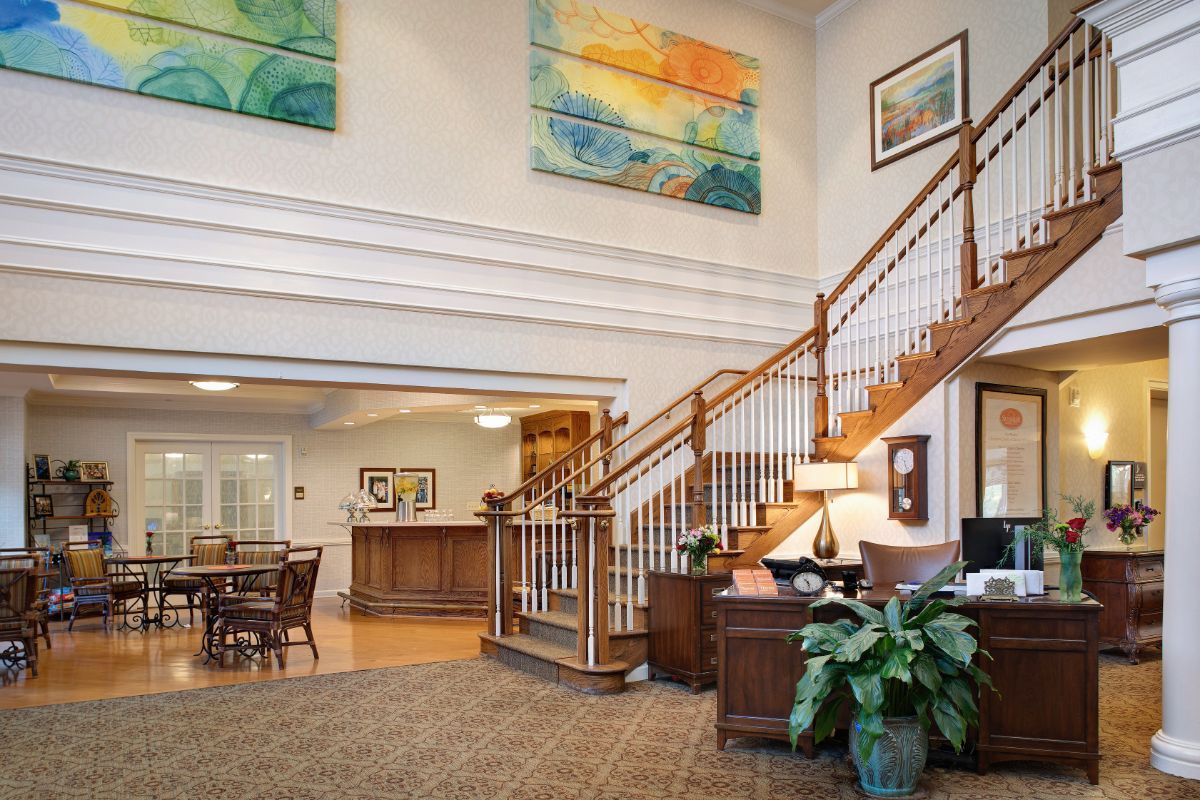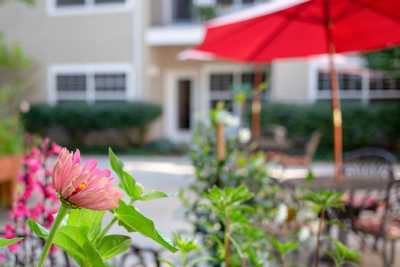How Small Memory Carehomes Charlotte Offer Close-Knit Attention
Wiki Article
All Concerning Memory Treatment Solutions: Why Small Memory Treatment Homes Are an Excellent Option
Memory care solutions play an essential duty in sustaining people with Alzheimer's and mental deterioration. Small memory care homes stand apart for their personalized strategy and intimate setting. With reduced staff-to-resident ratios, these homes cultivate stronger links and customized treatment. Residents take advantage of improved social interactions and a secure setting. As families check out options, comprehending the distinct benefits of small memory treatment homes becomes essential. What elements should be considered when selecting the right home?Comprehending Memory Treatment Services
While lots of may know with basic senior treatment alternatives, comprehending memory care solutions is crucial for households facing the obstacles of cognitive decrease. Memory treatment specifically deals with individuals with problems such as Alzheimer's condition and various other forms of dementia. These solutions give an organized setting that concentrates on boosting the quality of life for locals via specialized care and support.Memory treatment centers are designed to guarantee security and security, usually featuring protected atmospheres to avoid straying. Educated employee are offered around the clock to aid with day-to-day tasks, drug management, and personal care. Additionally, memory care programs often consist of cognitive excitement tasks, customized to engage residents and promote mental well-being. Family members can take advantage of understanding these services, as they enable educated decisions concerning their liked ones' care, guaranteeing that their specific demands and preferences are dealt with in a helpful and thoughtful manner.The Benefits of Tiny Memory Care Houses
Small memory treatment homes provide distinct benefits that can greatly improve the lifestyle for homeowners with cognitive impairments. One significant benefit is the intimate environment, which permits for individualized interactions among personnel and locals. This smaller setup cultivates significant connections, minimizing feelings of seclusion and anxiousness typically experienced by people with memory issues.Additionally, the reduced staff-to-resident ratio in tiny memory care homes enables caregivers to give more attentive supervision and support. This technique not just improves security but also advertises a complacency for the residents.Moreover, little memory care homes can adjust swiftly to the one-of-a-kind needs and preferences of each resident, permitting an extra homey atmosphere. Such a setting can urge social involvement and participation in activities, inevitably enriching the everyday experiences of those coping with cognitive problems.Personalized Care Program for Residents
Individualized treatment plans are important in memory treatment homes, as they deal with the special demands and preferences of each homeowner. These strategies begin with thorough evaluations carried out by experienced experts, who examine cognitive capabilities, case history, and personal interests. This tailored method assurances that care is not just effective but likewise respectful of each person's self-respect and autonomy.Moreover, customized treatment strategies are versatile, permitting adjustments as residents' needs develop gradually. This flexibility cultivates a feeling of safety and security and experience, which is crucial for individuals dealing with memory obstacles. Caretakers are educated to implement these plans constantly, giving assistance that aligns with the citizens' regimens and preferences.Ultimately, individualized care plans enhance the high quality of life for locals by promoting health, freedom, and involvement, making them a basic aspect of memory treatment solutions in small memory treatment homes.Developing a Home-Like Atmosphere
Producing a home-like environment is important for fostering convenience and knowledge in memory treatment settings, as it greatly influences locals' psychological health. Small memory treatment homes frequently focus on tailored touches, such as warm shade combinations, household images, and familiar furniture setups, which help locals feel extra comfortable. Integrating components reminiscent of a standard home, like comfy space and common locations, urges a sense of belonging.Moreover, utilizing all-natural light and exterior spaces can enhance the atmosphere, advertising leisure and serenity. Personnel play a considerable function in maintaining this atmosphere by involving with locals in a compassionate fashion, treating them like family. Routine activities, such as food preparation or horticulture, can also add to a home-like feeling, providing chances for homeowners to join purposeful experiences. On the whole, developing a supporting environment supports cognitive feature and psychological stability, making it an important aspect of memory treatment solutions.
Boosted Social Interaction and Neighborhood
Boosted social communication and area are important elements of memory care services. By cultivating individualized social involvement and developing a family-like atmosphere, these services promote significant connections amongst homeowners. Group occasions and tasks further encourage participation, helping people feel a lot more included and sustained.Individualized Social Interaction
While social interaction is vital for general well-being, lots of individuals with memory problems commonly have a hard time to engage meaningfully with others. Individualized social involvement in memory care homes addresses this obstacle by producing customized tasks that cater to citizens' unique interests and capabilities. By focusing on individual preferences, caregivers can promote links that reverberate deeply with everyone. Activities such as art treatment, songs sessions, and assisted discussions advertise cognitive stimulation and emotional expression. Furthermore, small team settings encourage camaraderie and allow for even more intimate interactions, improving sensations of belonging. This method not just combats feelings of isolation yet additionally empowers locals to preserve a sense of identification, eventually contributing to boosted psychological wellness and lifestyle.Family-like Environment
In a memory treatment setting, cultivating a family-like atmosphere greatly improves social communication and builds a sense of community amongst citizens. Smaller sized memory care homes typically focus on intimate settings, allowing citizens to create closer connections with one an additional and personnel participants. This nurturing environment promotes depend on, which is essential for individuals with memory impairments. Locals are more probable to engage in discussions and share experiences, developing an encouraging network that minimizes sensations of solitude. The familiarity of common areas and routines adds to a sense of belonging, further urging social interaction (personalized memory care). In such settings, emotional bonds grow, resulting in improved general health and a higher high quality of life for residents as they browse their day-to-day experiences with each otherTeam Activities and Occasions

Safety and Safety Functions in Small Homes
Lots of tiny homes created for memory care integrate crucial security and protection functions to assure the health of citizens. These homes often utilize safe entrance and departure indicate protect against roaming, a common worry amongst people with memory problems. Additionally, surveillance systems and alarm system systems improve monitoring, guaranteeing that staff can promptly respond to any type of unusual activities.Interior formats are tailored for safety, with lessened hazards such as sharp edges and clutter-free pathways. Handrails and non-slip floor covering are generally mounted to decrease the danger of drops. Employee are learnt emergency methods, guaranteeing they are planned for various situations.Moreover, personalized care plans may consist of analysis of private security requirements, giving customized solutions for each resident. Generally, these security and protection functions produce a caring atmosphere where residents can thrive while keeping their dignity and self-reliance.How to Select the Right Memory Treatment Home
How can families guarantee they select the most suitable memory care home for their liked ones? The decision requires careful consideration of numerous variables. First, family members should assess the center's personnel certifications and training, making certain that caregivers are experienced in handling memory-related problems. Next off, it's vital to evaluate the home's atmosphere, concentrating on safety and security attributes and whether it promotes a sense of area and belonging. Checking out the facility can provide insight into daily activities and the social atmosphere, which are vital for psychological excitement and emotional health. Furthermore, family members should inquire concerning the care strategies supplied, ensuring they are tailored to private needs. Thinking about the home's place and availability for family members sees can add to a smoother shift. By dealing with these aspects, households can make an educated choice that prioritizes their loved one's comfort and quality of life in a memory care setup.Frequently Asked Inquiries
What Credentials Should Staff Members in Memory Treatment Houses Have?
Team member in memory treatment homes must possess appropriate certifications, experience in mental deterioration treatment, strong communication skills, and compassion. Continuous training in behavior monitoring and healing interventions improves their capacity to sustain locals successfully.Just How Do Memory Care Solutions Differ From Standard Assisted Living?
Memory care solutions focus particularly on individuals with memory problems, offering specialized support and structured settings. In comparison, traditional assisted living offers general assistance with daily tasks, doing not have the tailored approach necessary for those with cognitive obstacles.What Kinds of Activities Are Used in Memory Treatment Houses?
Memory care homes commonly provide a range of tasks created to involve citizens. Usual alternatives consist of art therapy, songs sessions, cognitive video games, workouts, gardening, and gatherings, all focused on enhancing well-being and cognitive feature.Can Residents Bring Their Own Items to Memory Care Houses?
Homeowners can commonly bring their own possessions to memory treatment homes, allowing them to personalize their home - personalized memory care. This technique assists create a familiar environment, advertising convenience and a sense of identification for the people
Exactly How Are Family Members Members Associated With the Care Refine?
Relative play a vital duty in the treatment procedure, commonly taking part in decision-making, going to care meetings, and providing psychological support. Their participation cultivates a collaborative atmosphere, boosting the resident's general wellness and top quality of life. While many may be familiar with basic elderly treatment alternatives, recognizing memory treatment services is necessary for families encountering the obstacles of cognitive decrease. These solutions supply an organized environment that concentrates on enhancing the quality of life for citizens with specialized care and support.Memory treatment facilities are designed to assure safety and security, often featuring protected atmospheres to stop straying. Individualized care plans are important in memory treatment homes, as they cater to the special requirements and choices of each homeowner. Personnel participants in memory treatment homes ought to have relevant qualifications, experience in dementia care, solid communication abilities, and concern. Memory treatment services focus specifically on individuals with memory impairments, providing customized assistance and structured environments.Report this wiki page